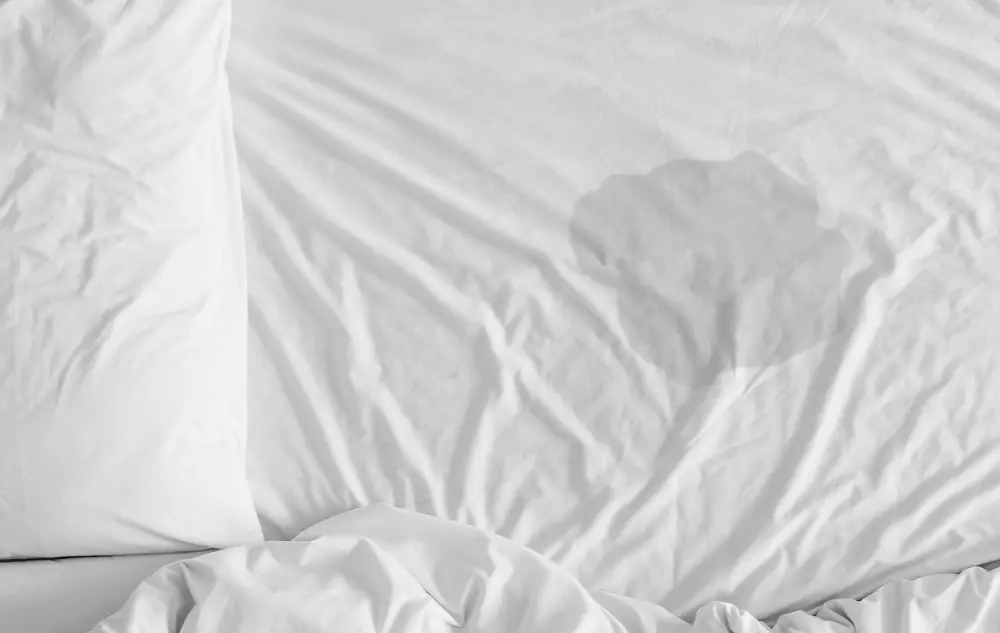
7 Failproof Ways to Stop Bedwetting in Children
Amalala Mai pitsarin kwan ce
Ya tsula ya koma tsulawa
Da ya tsula sai da ya kai Sokoto
The above is a very popular song used to shame those who bed wet as kids. They are asked to serve punishments like carry their beds or stand naked while siblings and other family members sing the above song. This is a familiar scenario in most homes in the north where a child’s bed wets.
Bedwetting is the loss of bladder control while sleeping at night. It is scientifically known as Nocturnal enuresis. Bedwetting is a standard developmental stage among children below the age of 5 because the child is yet to develop nighttime bladder control and only becomes a cause for concern when the child is above the age of 7.
It has been confirmed that the number of boys that bed wet is twice that of girls and that 2% of adults suffer from bedwetting. The percentage may be higher but most adults are too ashamed to talk to their doctors about it.
In most cases, people have reported dreaming that they had woken up to relieve themselves only to wake up and find that they did it in their beds.
Causes of Bedwetting
There is not an exact known cause for bedwetting but these are common factors that contribute;
1. A Small Bladder
The child’s bladder may not have developed.
2. A Hormone Imbalance
Some people do not produce enough anti-diuretic hormones (ADH) to slow down night urination.
3. Sleep Apnea
Bedwetting is a sign that a person may be suffering from sleep apnea (The obstruction of breathing during sleep.) Urinating during sleep may become more frequent as the sleep apnea worsens.
4. Diabetes
When blood sugar is high, it may lead to bedwetting.
Other signs include passing a large amount of urine and increased thirst.
5. A Structural Problem in the Urinary Tract or Nervous System
Bedwetting could be related to a defect in the urinary or nervous system.
6. Chronic Constipation
Muscles that control urine and stool are the same, so when constipation is prolonged it may lead to bedwetting.
7. Genetics
Bedwetting is mostly transferred from generation to generation though it is not clear which genes are responsible for the transfer.
In many cases, bedwetting has a genetic pattern, inherited from a parent, aunt, or uncle.
Tips to Deal With Wetness
To manage bedwetting here are some tips to help
- Spread out sheets and clothes in the air for proper drying
- Put a waterproof cover or pad over your mattress or sheets to keep them dry.
- Wear absorbent underwear or pads to bed.
- Use special skin cleansing cloths and lotions to prevent your skin from getting irritated.
- To help reduce the stench, Add a few pinches of salt to a bowl of warm water and sprinkle on places that have been soaked with urine e.g rugs, mattresses, etc. Scrub out and allow for drying
How to Stop Bedwetting
1. Manage Daytime Fluid Intake and Urination
Work with your child to make a habit of urinating every two or three hours during the day, even when they don’t feel the need. Have them urinate twice at bedtime — once an hour before they go to bed and then again right before they go to bed. This is one of the ways to stop bedwetting.
Encourage your child to drink plenty of fluids early in the day, rather than waiting until the end of the day to quench their thirst. Children who participate in sports late in the day should hydrate before their practice or game, then try to limit fluid intake during the evening.
2. Minimize Discomfort at Night and Provide Easy Access to the Toilet
Use a waterproof mattress cover and keep a clean set of sheets and sleepwear at hand in case a change is needed. Set a goal for your child of getting up at night to use the toilet. Help your child understand that it is more important to wake up every night to use the toilet.
To stop bedwetting, make sure the child has easy access to the toilet and provide a portable toilet if necessary.
3. Talk with your Child’s Primary Care Provider About Medication
Some children are helped by a medication — DDAVP®, or desmopressin — taken as a pill before bedtime to reduce the amount of urine produced at night.
4. Avoid Blaming or Punishing your Child
Bedwetting can damage the child’s self-image and confidence. The best way to prevent this is to be supportive. Parents should reassure the child that bedwetting is a common problem and try to avoid blaming or punishing their child. Remember, your child cannot control the bedwetting, and blaming and punishing will just make the problem worse.
If you or your spouse wet the bed as a kid, remind your child that mommy or daddy had the same issue and eventually outgrew it.
5. Enforce a “no Teasing” Rule in the Family
No one is allowed to tease the child about the bedwetting, including those outside the immediate family. Do not discuss the bedwetting in front of other family members.
6. Encourage Responsibility
Have your child help in the clean-up process. Make clean-up easy. To increase comfort and reduce damage, use washable absorbent sheets, layer sheets among waterproof bed covers, and use room deodorizers.
7. Monitor your Child’s Bowel Movements
Constipation can interfere with the complete and efficient emptying of the bladder. To stop bedwetting in children, talk to your paediatrician if your child has trouble with constipation.
Conclusion
Enabling your child scale through the bedwetting stage is quite challenging and requires a loaded truck of patience while you adhere to the steps listed in this post.
Also, what do you plan to do differently henceforth to help your child overcome bedwetting?
